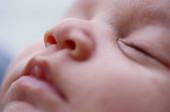Across-institution variation in recommendations for CSF testing, ceftriaxone use in infants 29-56 days old
MONDAY, Feb. 23, 2015 (HealthDay News) — Emergency department clinical practice guideline (CPG) recommendations contribute to observed practice variation in febrile infants, according to a study published online Feb. 13 in the Journal of Hospital Medicine.
Paul L. Aronson, M.D., from the Yale School of Medicine in New Haven, Conn., and colleagues examined the correlation between pediatric emergency department CPGs and laboratory testing, hospitalization, ceftriaxone use, and costs for febrile infants in 33 hospitals in the Pediatric Health Information System. Generalized estimating equations were used to examine the correlation between CPG recommendations and rates of urine, blood, cerebrospinal fluid (CSF) testing; hospitalization; and ceftriaxone use at emergency department discharge for infants aged ≤28 days and aged 29 to 56 days.
The researchers found that CPG recommendations did not vary for neonates aged ≤28 days, and there were no correlations with differences in testing, hospitalization, or costs. CPG recommendations for CSF testing and ceftriaxone use varied among infants aged 29 to 56 days. Compared with hospitals without CPGs, at emergency departments with CPGs recommending limited testing, CSF testing occurred less often (adjusted odds ratio, 0.50). There was significant variation in ceftriaxone use at emergency department discharge based on CPG recommendations. For admitted and discharged infants aged 29 to 56 days, costs were higher at hospitals with CPGs.
“CPG recommendations for febrile infants 29 to 56 days old vary across institutions for CSF testing and ceftriaxone use, correlating with observed practice variation,” the authors write.
Copyright © 2015 HealthDay. All rights reserved.








